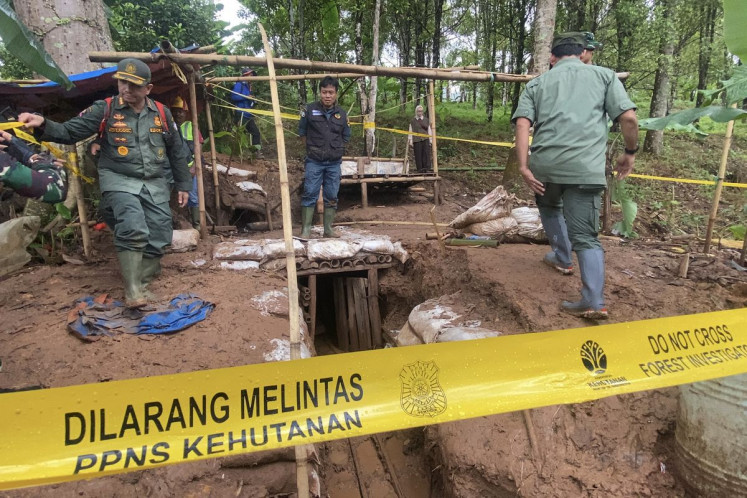Popular Reads
Top Results
Can't find what you're looking for?
View all search resultsPopular Reads
Top Results
Can't find what you're looking for?
View all search resultsPPATK spots terrorism-linked bank transfers
An investigation carried out by the Financial Transaction Reports and Analysis Centre (PPATK) has found that a lack of supervision by financial authorities has caused the country to see increasing numbers of cash transfers allegedly channeled to fund terror activities in the country during 2014
Change text size
Gift Premium Articles
to Anyone
A
n investigation carried out by the Financial Transaction Reports and Analysis Centre (PPATK) has found that a lack of supervision by financial authorities has caused the country to see increasing numbers of cash transfers allegedly channeled to fund terror activities in the country during 2014.
The agency chairman, Muhammad Yusuf, said Wednesday that most of the cash transfers took place in Jakarta, West Java, East Java, Central Java, Central Sulawesi, Banten, Yogyakarta, West Nusa Tenggara (NTB) and South Sulawesi.
'The most apparent funding type is domestic funding, which comes from donations and the misuse of funds intended for nonprofit organizations, as well as cash obtained from criminal activities such as robberies,' Yusuf said.
In addition, Yusuf said the transferred cash was also used to fund activities related to programs to maintain the existence of radical groups across the country.
'For example in Poso, Central Sulawesi, the transferred funds were used to finance the basic needs of the wives and widows of terrorists. They don't keep the money long in their bank accounts. As soon as it is transferred, they withdraw it and move the cash from one hand to another. That way, it will be hard to track the funding,' Yusuf said.
'Corporations or enterprises, especially foundations, pose a higher risk of being used as tools to launder terrorist funds. In terms of actors, students and unregistered NGO officials are those who are prone to being involved in the process of money laundering for terror,' Yusuf added.
The PPATK findings reveal that, in a move to avoid their identities being tracked by financial authorities, terrorist supporters opened bank accounts using fake identities, or bought bank accounts from third parties that had no connection to their groups.
'The use of third parties in this particular context is meant to preserve the flow of funding. If the main actors in the field are arrested, the funding will keep flowing to finance new members who continue perpetrating terror in the field,' Yusuf.
The PPATK called on the government to demand goods and services providers, including financial institutions, apply a 'know your customers' policy and to actively report to PPATK and law enforcement institutions should they find suspicious transfers that might potentially be related to terror funding.
In addition, in a case related to terror funding, Saudi citizen Al Khelaiw Ali Abdullah, who was earlier convicted of helping finance the simultaneous terrorist attacks on the Ritz-Carlton and JW Marriott hotels in Jakarta in 2010 and violating the immigration law by the Supreme Court, was freed from the terrorism charge after the same court approved his proposal for a case review in February 2012.
Saudi Embassy lawyer Rudi Alfonso confirmed that the court had lifted the terrorism charge against Ali.
'The Supreme Court found that the earlier terrorism charge did not represent the truth of what had actually happened in his case,' Rudi said on Thursday.
Ali was accused of lending money to Syaefudin Zuhri, one of the alleged masterminds of the twin hotel attacks, after meeting him and a man who later turned out to be one of the suicide bombers at the airport in Jakarta. Zuhri, who was killed by anti-terror police during a raid in October, helped the Saudi by sponsoring his six-month visa.
Despite the prosecutors' assurance that Ali had committed terrorism, a panel of judges at the South Jakarta District Court in June 2010, however, insisted that he only violated the immigration law for entering the country several times since 2008 and running a business without a proper visa.
The Jakarta High Court later upheld the verdict, only for the Supreme Court to revoke it at the cassation level in January 2011 and convict Ali of financing terrorism.
However, in the same year, Ali challenged the cassation verdict and won a case review that acquitted him of the terrorism charge in early 2012.










